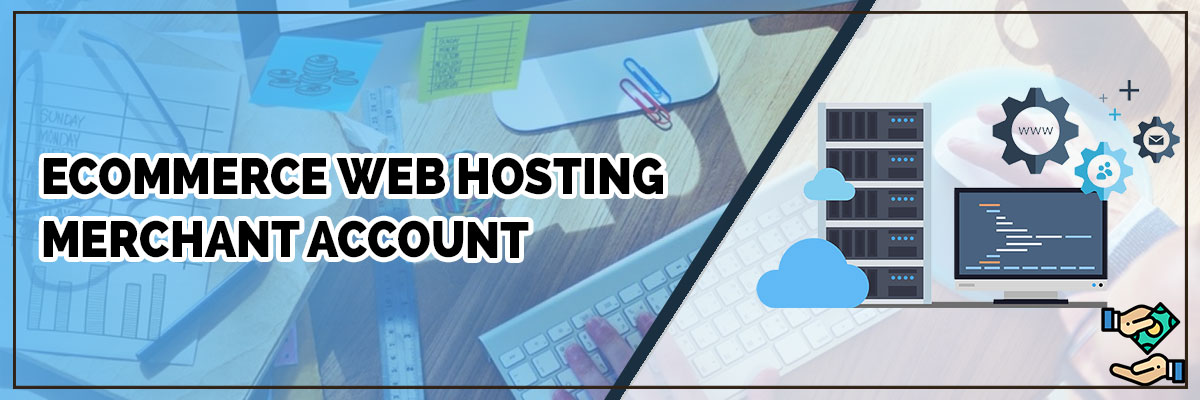
The convenience of eCommerce has made it the biggest sales platform across the globe. In 2020, e-retail sales surpassed $4.2 USD trillion in revenue, with over 2 billion people transacting online in the United States alone. So yes, eCommerce is big business.
With so much money pouring into eCommerce, businesses without an e-retail storefront fall behind versus competition. So, eCommerce web hosting services are booming. The only problem? Securing an eCommerce web hosting merchant account isn’t quite as straightforward.
Any business conducting transactions online would have to have a merchant account. In fact, even brick-and-mortar that take cashless payments through credit and debit cards (to name a few) require the functions of a merchant account.
But what exactly are these merchant accounts? In the world of finance, a merchant account is a specialized business-only bank account that allows merchants to take cashless, digital payments. These payments can come in the form of credit cards, debit cards, eChecks, and ACH payments.
Through a merchant account, a business can communicate with card issuers and other financial institutions to collect payments from buyers without the need for cash. For merchants transacting online, a merchant account opens the opportunity for card-not-present transactions.
That is, taking payments from credit and debit cards without even having to swipe a physical card through a terminal. For as convenient and efficient as a merchant account might seem, they’re not just handed out to every Tom, Dick, or Harry.
With cashless payments comes the risk of chargebacks. Back in the day, customers didn’t want to use credit and debit cards, fearing for the security of their money. So to reassure them of their safety, financial service providers developed the chargeback.
This allows customers to reverse transactions and get their money back — no questions asked. Over the years, however, chargebacks have become known as ‘friendly fraud’, with some cardholders abusing the failsafe to have their cake and eat it too.
With that, banks have been careful to issue merchant accounts to businesses at a higher risk of chargebacks. And according to their standards, eCommerce web hosting services fall in the high-risk category.

Banks and merchant acquirers consider a number of factors in order to identify high-risk merchants. These include things like their physical, and geographical location, the average revenue they make in a month, the average cost of each of their transactions, and whether they take subscriptions or not.
Since eCommerce web hosting merchants tick a majority of the factors on this list, they’ve become tagged as one of the most common high-risk merchants. But to give you a more concrete idea of where that risk comes from, here are some of the major factors:
One of the biggest problems that banks have with eCommerce web hosting merchants is the absence of any physical product. Without a tangible item to represent the transaction, it becomes harder to identify whether the services were rendered in the first place.
This places eCommerce web hosting merchants at a higher risk of fraud. On top of that, there’s no black-and-white contract that details whether services were offered satisfactorily. All of this lack of evidence and documentation just makes the whole picture a little iffy for banks that tend to be empirical.
It’s tough to find an eCommerce web hosting service that offers products and services face-to-face. That’s because the whole point of availing of eCommerce web hosting services is so that you can operate your business online.
This means that all transactions that pass through eCommerce web hosting merchants use cashless, digital payments. And while card-not-present transactions can be particularly convenient, having nothing but these cardless transactions increases your potential risk.
Fraudsters abound, and even amateurs can easily access and steal card information and make unauthorized transactions. When cardholders identify the fraudulent activity when their statement arrives, they can simply reverse the transaction with a chargeback.
Most (if not all) web hosting services use a recurring payment structure that makes it easier for customers to afford services. These monthly subscriptions are made possible through payment gateways that store card information and use them to take payments without the customer’s manual involvement.
While this allows seamless service provision for customers, it also presents unique risks for merchant acquirers. When clients intend to cancel their subscription but fail to do so before the next billing date, they can simply opt for a chargeback to reverse the payment and get their money back.
Traditional banks and acquirers could give you the green light on a high-risk eCommerce web hosting merchant account, but not without putting you through a gauntlet of requirements and waiting.
On top of that, approval from traditional providers often comes hand in hand with various loopholes, strict contracts, stifling payout terms, and sky-high penalties and charges. So while it’s definitely possible to open a high-risk eCommerce web hosting merchant account with a traditional merchant acquirer, doesn’t mean you have to.
Here at Shark Processing, we offer custom solutions to hard-to-place merchants who want to level the playing field. We work with a wide network of reputable merchant account providers who openly and willingly accommodate high-risk merchants minus the suffocating contracts.
Shark Processing believes that every merchant should have a shot at going cashless — regardless of the risk. We work to champion our clients and stand on your behalf to negotiate contract terms that give your business room to grow.
At Shark Processing, there’s no need to take gambles with conventional, conservative merchant acquirers who would rather protect their business than help you grow.
Contact us today to find out how we can help you get your hands on a high-risk eCommerce merchant account, or send in your pre-application form to get started on your merchant account ASAP.

